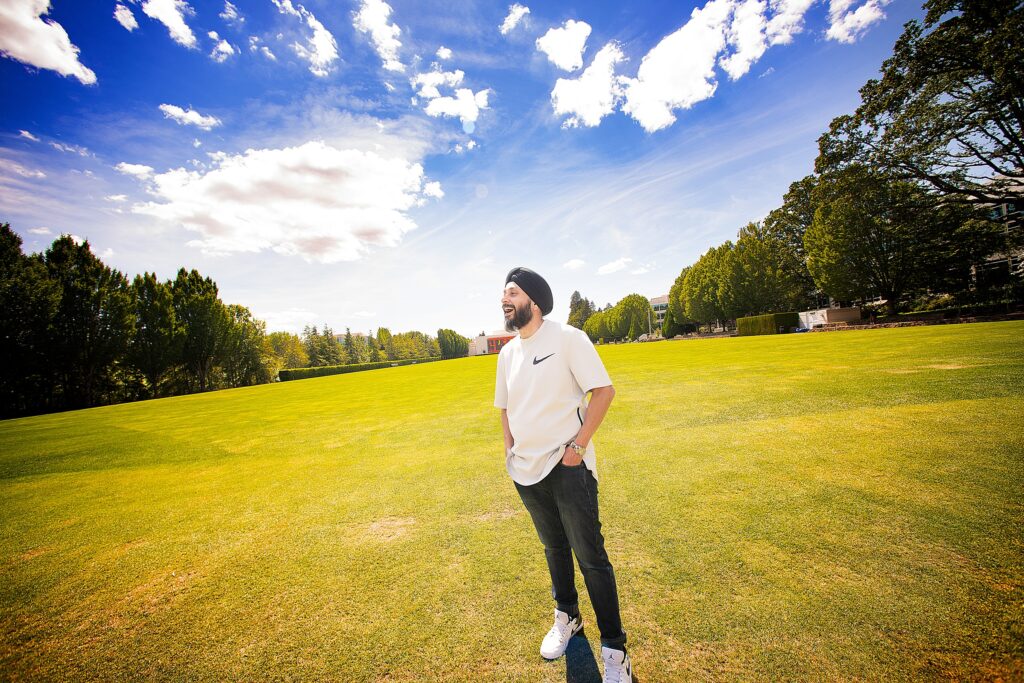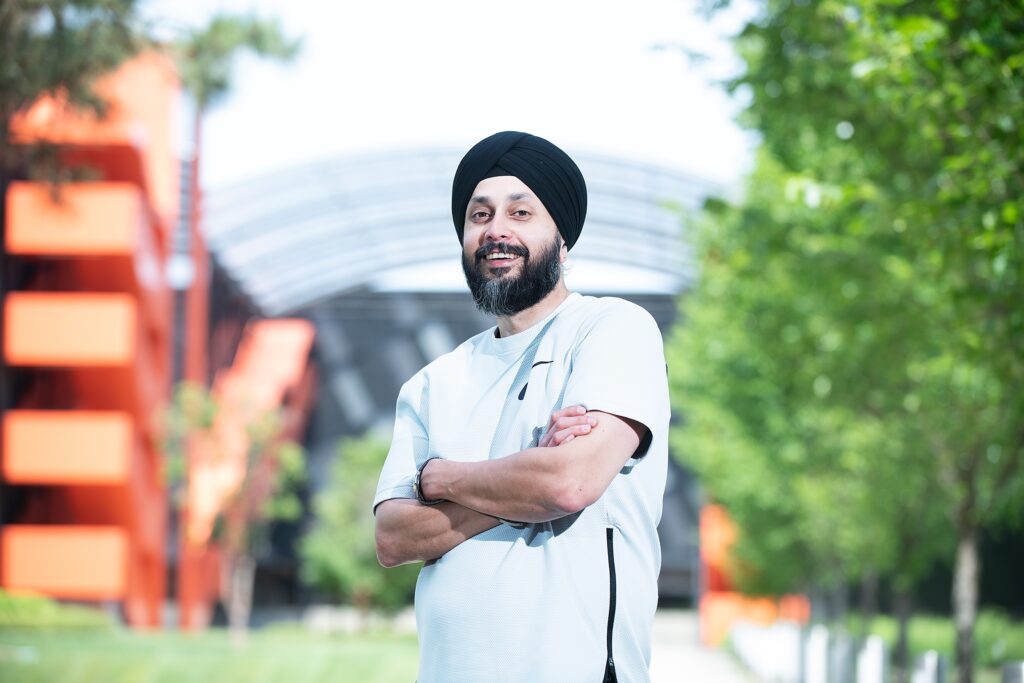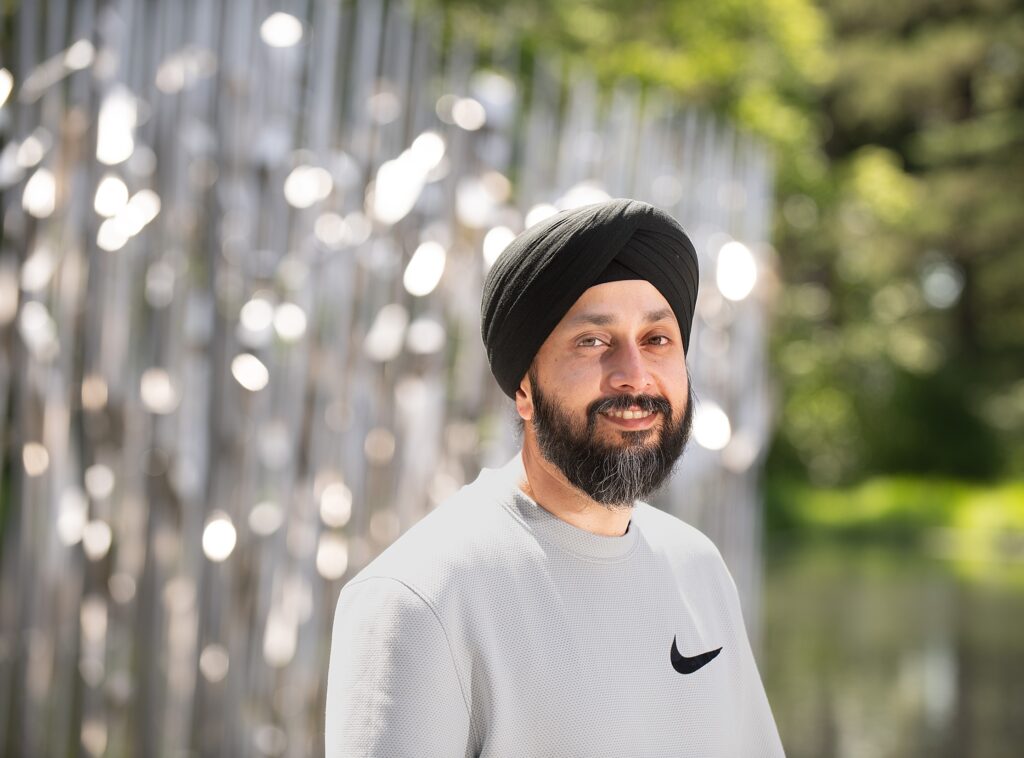Raminder Chadha Just Did It: Why He Chose the Executive MBA
At the University of Washington, Raminder Chadha found the strategy, support, and perspective he needed to grow at Nike.
After 17 years at Nike, Raminder Chadha could have stayed in his lane. He was thriving as a software engineering lead, delivering global rollouts and helping Nike forecast inventory at scale. But even top performers hit a ceiling, and he wanted to break through it.
“I kept asking, ‘What do I need to get to the next level?’” he recalls. “My leaders told me I had strong skills but needed to think more strategically. I didn’t even know what that meant at the time.”
That question launched his search for something more. Raminder found it in the Executive MBA program at the University of Washington Foster School of Business.
“A mentor advised me, ‘To move forward, you need to round out your leadership style.’ That struck a chord. I realized I was missing something, and it wasn’t technical skills; it was perspective. I began asking myself: What kind of educational experience could challenge and shape me at this stage in my career? That’s what led me to the Executive MBA. I didn’t want theory; I wanted to learn alongside experienced professionals who could elevate my thinking just as much as the curriculum would.”

An investment for leaders who want more
For seasoned professionals, the Foster Executive MBA isn’t about learning the basics. It’s about transforming how you think and lead.
“If you already know your industry and want to scale your impact, this is the program,” he says. “It’s not for beginners. It’s for people who want to lead with intent. I knew that if I went to the University of Washington, I’d be surrounded by like-minded people and I could learn from them. That was key for me, not just the content, but the people.”
In pursuing the Executive MBA, he wasn’t after a credential. He was after growth. “I didn’t just want to lead more; I wanted to lead differently,” he recalls. “And that’s exactly what happened.”
The power of monthly immersion
With a full-time job, two children, and a busy family calendar, he needed an MBA that fit his reality. Foster’s monthly immersion model offered exactly that. Each month, he commuted from Portland to Seattle for a four-day session, staying in the same hotel as his peers and classmates.
“Those four days each month were the best part of the experience,” he says. “It gave me time away from work and routines, and time to focus on learning, development, and fun. When we work 40, 50, or even 60 hours a week, week after week, we don’t dedicate enough time to ourselves.”
For Raminder, the monthly format wasn’t just convenient; it was energizing. “You’re staying in a hotel. You’re not cleaning dishes. You’re not cooking,” he says, laughing. “You can stop everything else and focus specifically on this. It gives you space to learn and reflect. That’s rare. Time for personal development is something most professionals never get.”

Learning across industries
From the first immersion, he recalls the biggest surprise about the Executive MBA wasn’t the curriculum but the cohort.
“I almost learned more from my classmates than from textbooks,” he says. “Our cohort included people from shipping, real estate, manufacturing, technology, and medical; everyone brought a different perspective. That was phenomenal.”
After nearly two decades at one company, Raminder realized how easy it is to get boxed into one way of thinking. “I only knew how Nike does things, I only ‘spoke’ Nike,” he shares. “But there are a hundred ways to solve a problem and improve a process or product. Hearing how other industries approach challenges was a game changer.”
Even casual conversations became moments of insight. “We’d hang out in the hotel lobby, grab drinks, and share challenges from work. One problem, five different solutions; it was incredible.”
From the Executive MBA classroom to the real world
Raminder didn’t expect how quickly his learning would translate to impact.
He pointed to a statistics class—something he thought would be irrelevant. “At first, I thought, ‘Why are we learning this?’ But it was exactly what I needed at work,” he says.
At Nike, he applied his knowledge to build more advanced forecasting tools. “We improved our reporting and made our data more powerful, thanks to many of the learnings from that class,” he said. “It wasn’t just a classroom lesson. It applied directly to work. I found it profoundly useful. If you don’t apply what you’re learning immediately, it fades. But when you take those lessons and talk through them with your team—even just the conversation—it adds value.”
By the end of his first year in the program, Raminder was promoted to engineering manager. Six months later, he received a raise, offering immediate ROI for investing in the Executive MBA. Most recently, Nike promoted him to senior engineering manager.

Support that goes beyond the classroom
Raminder believes that one of the program’s most important aspects is the support and guidance that students receive from Foster staff.
“There was a point when I was ready to quit,” he recalls. “And Randell Hernandez, the director of admissions, helped me get through it. His support wasn’t just academic, but also coaching and emotional support. He offered insights and perspectives that I couldn’t get anywhere else. That’s hard to describe, but it made all the difference.”
He emphasizes that kind of personal connection is one of the program’s most overlooked strengths. “The staff doesn’t just manage logistics. They walk with you, every step of the way.”
Finding joy in the journey
Raminder also found plenty to enjoy outside the classroom. A dedicated fitness enthusiast, he wakes up at 4:30 a.m. every morning to hit the gym. He’s a self-proclaimed Nike loyalist with an Air Force 1 collection and a love for Jordan apparel.
He also loved staying in the heart of Seattle. “Being in the University District and on the University of Washington campus made me feel younger,” he says. “There’s energy everywhere: students, restaurants, late-night conversations. It was refreshing.”
He made time to study, connect, and explore while building the mindset and skills to take on whatever came next.

Planning for the future
In the final months of the program, Raminder and his team won the business plan competition. It sparked something unexpected in him.
“I’d always planned to retire at Nike,” he says. “But that experience made me think about taking on a different role or even building something of my own one day. It gave me the confidence to dream bigger.”
While he has no immediate plans to make the leap to entrepreneurship, he credits the program with expanding his vision. “The Executive MBA isn’t about becoming a better employee,” he says. “It’s about becoming a better leader.”
“The Foster Executive MBA didn’t just sharpen my business acumen, it transformed how I lead, think, and deliver impact,” Raminder concludes. “I returned to Nike with a broader strategic lens, stronger cross-functional insight, and the confidence to challenge the status quo. I’ve already applied these learnings to drive meaningful improvements in our supply chain platforms and team performance. But this is just the beginning. I’m more energized than ever to lead Nike into what’s next, with a mindset built for scale and a drive to deliver lasting value.”
Learn more about the Executive MBA here.
